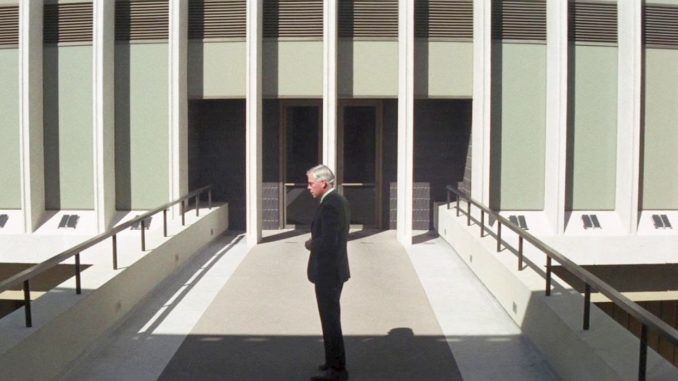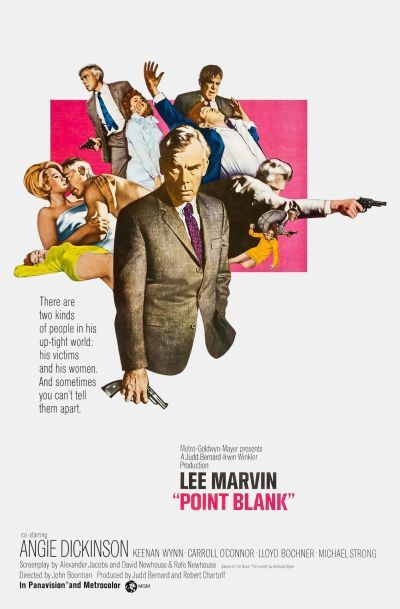
Rating: B
Dir: John Boorman
Star: Lee Marvin, Angie Dickinson, Keenan Wynn, John Vernon
There’s a scene in this where Dickinson’s character gets so angry with Walker, the career criminal played by Marvin, she starts hitting him. And hitting him. And hitting him. Walker just stands there, as she whales on him. The woman might as well be pummeling the Rock of Gibraltar. She eventually collapses exhausted, and Walker just turns and walks away without a word. That’s how macho this film is. I felt, as a viewer, I should be smoking a cigar and drinking a glass of whiskey, while Chris massaged my feet. Although I can hardly blame Walker for being grumpy. He was shot on Alcatraz by Mal Reese (Vernon), his partner in a robbery who needed all the loot to pay off his debts. That’ll derail anyone’s day.
Reese, however, makes the fatal mistake of not making sure Walker is dead, instead scampering away with Walker’s wife. When the victim recovers, he’s not happy about it, obviously. He tracks down his wife, and guilt at her betrayal causes her to commit suicide. Discovering Reese has taken up with his sister-in-law, Chris (Dickinson), Walker finds her, in order to get to his traitorous ex-partner. Then, discovering Reese can’t repay the money, having already used it for his debts, Walker goes after the shadowy organization to whom Reese owed money. They’re not happy either, to be dragged into Walker’s relentless quest for what he believes to be his. In hindsight: just give the man his money. Trust me.
 This feels like an American ancestor of Get Carter, both being the story of a taciturn man’s lone, relentless and violent pursuit up the criminal ladder, to right a perceived injustice. Does it “matter”? Arguably not, when balanced against the resulting mayhem. But it’s about respect, honour, and other attributes which nowadays probably get called toxic masculinity. “You threaten a financial structure like this for $93,000?”, asks one of the organization’s leaders incredulously, when confronted in his office by Walker. “What do you really want?” Without hesitation, Walker responds, “I really want my money.” He’s not a complex man, and while he might feel for Chris – it’s hard to tell – any such emotions are very much secondary to the pursuit of his goal.
This feels like an American ancestor of Get Carter, both being the story of a taciturn man’s lone, relentless and violent pursuit up the criminal ladder, to right a perceived injustice. Does it “matter”? Arguably not, when balanced against the resulting mayhem. But it’s about respect, honour, and other attributes which nowadays probably get called toxic masculinity. “You threaten a financial structure like this for $93,000?”, asks one of the organization’s leaders incredulously, when confronted in his office by Walker. “What do you really want?” Without hesitation, Walker responds, “I really want my money.” He’s not a complex man, and while he might feel for Chris – it’s hard to tell – any such emotions are very much secondary to the pursuit of his goal.
There’s an interesting theory suggesting Walker died on Alcatraz, and the rest of the film is just his mind winding down with thoughts of vengeance. Boorman hasn’t expressed any particular opinion, but it would explain the hero’s apparent invincibility. And, perhaps, the rather psychedelic elements too, such as Walker’s arrival in Los Angeles, accompanied by the relentless sounds of his boots marching through an otherwise empty airport. Marvin owns the role, operating somewhat between the T-800 and The Man With No Name. Almost as much fun is watching the sixties architecture, fashions and vehicles. For this was a time when a car could ram repeatedly into a concrete pillar and keep running. Crumple zones and air-bags? What are those? Walker is in no need of such frippery.
